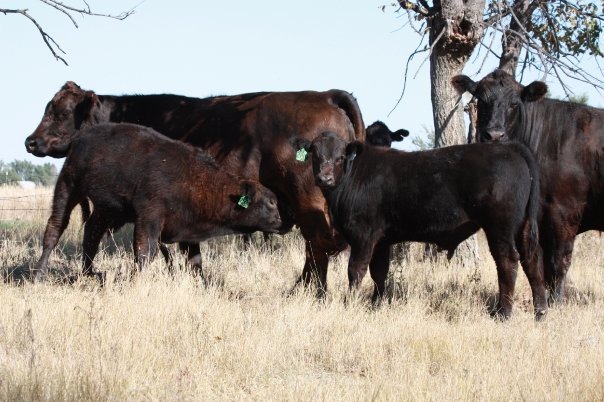What do we need to do to protect our natural resources and provide more food for people around the world? Cattle may just be the answer.
January 31, 2018

Bill Gates has made headlines in recent months for his investments in clean meat companies. The premise behind these companies is to use animal tissues to culture meat cells in a lab and create a “cruelty-free” meat alternative that would require fewer natural resources. Plus, with the growing popularity of vegan and vegetarian options (even McDonald’s is offering a new McVegan burger), these billionaires more than likely see dollar signs.
READ: Why Bill Gates and Richard Branson invested in clean meat
While the demand for meatless options in today’s society continues to move forward, I believe the choice to go meatless is often based on erroneous information. For example, the common misconception that cattle are major greenhouse gas contributors is dead wrong, and grazing cattle working in conjunction with various environments is a pretty sustainable model and an efficient way to utilize rough terrain and turn it into tasty and nutritious beef.
READ: Beef's sustainability advantage
Despite this information, I don’t see the clean meat movement going away anytime soon. After all, there are numerous business moguls joining Bill Gates in investing in these products. However, these guilt-free burgers aren’t getting rave reviews, and achieving the same juiciness and umami flavors that beef has to offer from vegetable proteins or cultured animal tissues could be a tall order to achieve, no matter how these clean burger manufacturers try to spin it.
In a recent article for The Washington Times, Rick Berman explains why eight in every 10 vegans eventually go back to eating meat. The reason? The fake meat burgers taste so bad.
READ: Clean meat? It's not that simple
Berman says, “I tried the Beyond Burger, a new fake meat that bills itself as ‘the world’s first plant-based burger that looks, cooks, and tastes like a fresh beef burger.’ Piled high with toppings, it looked wholly promising. By appearances alone, you could almost be convinced that the lab-grown patty came from a cow raised on the same farm as the tomatoes and lettuce piled on top of it. But that’s where the similarities end.
“The patty was virtually tasteless — and I use that adjective liberally. Today’s virtual reality video games offer a more convincing version of reality than this burger patty. It’s no coincidence why coverage of the Beyond Burger and its principle competitor, the Impossible Burger, focus on how meatlike the burgers ‘look.’ A major selling point of both burgers are their ability to ‘bleed’ beet juice and ooze (vegetable-based) fat while they grill. But the flavor? It’s less convincing than a knockoff handbag.”
What’s more, Berman urges consumers to consider how these meatless patties are made — liquefied, defatted and reconstituted vegetables and coconut oils. For example, Tofurkey’s ground beef, he says, contains 14 ingredients, while Morningstar’s Chick’n Nuggets have 58 ingredients.
“Any one of these ingredients is enough to rally the green food armies, yet their presence is conveniently overlooked when it comes to fake meat. As a comparison, Ballpark beef patties contain two major ingredients: beef, and water, and less than 2% of seasonings, sugar, and yeast. Real beef burgers don’t need an excess of additives, emulsifiers or thickening agents for consumers to stomach them.”
Ultimately, Berman concludes if hard core vegetarians and vegans can’t stomach these fake burgers, it will be a long road to convince the masses to swap out their juicy cheeseburgers for an imposter created in a lab setting, and I definitely agree!
READ: The ‘plant-based burger’ scam
As we look at investors like Bill Gates though, his investment portfolio is a mixed bag. On one hand, he’s teamed up with clean meat companies to reduce the need for livestock production. On the other hand, he strongly believes that better livestock genetics could help impoverished and hungry people around the globe.
"If you care about the poor, you should care about agriculture. And if you care about agriculture, you care about livestock," Gates told an audience at the University of Edinburgh, as reported by Adela Suliman for Thomson Reuters Foundation News. "What that means in this context is helping poor farmers get as much as possible out of their animals.”
According to Suliman, “Livestock - which include cattle, sheep and goats - are a source of nutrition and income, and a long-term asset for families. Improving their health and productivity can substantially benefit vulnerable farmers who are often one bad harvest away from ruin.
“The Gates Foundation will invest $40 million in projects to develop livestock vaccines and make them accessible to the poorest small-scale farmers across Africa and South Asia through the Global Alliance for Livestock Veterinary Medicines, a public-private partnership based in Edinburgh.
“About 750 million people in low- and middle-income countries depend on livestock farming, says the International Livestock Research Institute, with the sector accounting for 40% of agricultural GDP globally.”
READ: ‘Super’ crops and cows — Bill Gates injects cash into farm science
I’m all for improving cattle genetics and applying the knowledge we currently have at our disposal to benefit poor nations that rely on livestock to survive. For example, with genetic editing, we could potentially take a breed of cattle that is naturally heat tolerant and tailor it to also yield more meat, bigger ribeyes and even added marbling. What a concept!
The times are sure changing, and beef producers in the U.S. need to be at the table to discuss beneficial options, existing technologies and new methods that could produce more beef and dairy for people around the world.
The opinions of Amanda Radke are not necessarily those of beefmagazine.com or Farm Progress.
About the Author(s)
You May Also Like





